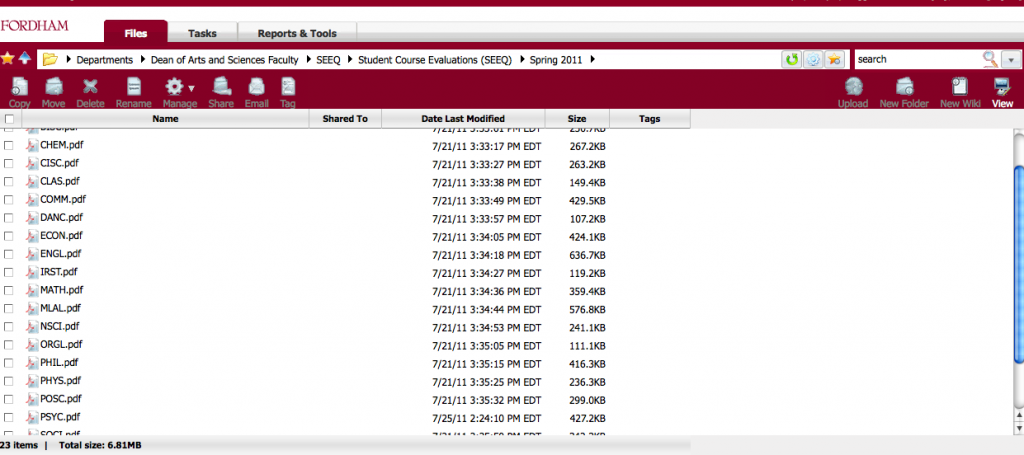SEEQ Evaluations Available Online for Students
October 27, 2011

Ever wonder if you could see how your friends ranked a professor on end-of-semester course evaluations? You can. The SEEQ (Summary of the Students’ Evaluation of Educational Quality) forms filled out each semester are available online for Fordham students to access. And this week, a Fordham College at Lincoln Center (FCLC) dean will be sending a unique URL for students to see what their peers thought about certain courses and professors.
After clicking the link and logging on with an AccessIT ID, students will be directed to a specific section of MyFiles where they can narrow down instructors and classes by semester, year and subject. The downloadable reports organize information about each professor and class through a searchable PDF file. Bar graphs present aspects about the course and teaching style in a similar format that paper evaluations are filled out: a score of one if you strongly disagree to nine if you strongly agree.
Categories include criteria such as professor enthusiasm, examinations/grading and group interaction. A section also indicates the workload and difficulty from one to nine.
While this URL will be made available to students by email, it will not be publicized to the whole Fordham community. As a result, faculty won’t be able to compare themselves to others within their department unless they find out what the link is.
“These evaluations are really for students to respond to their instructors and tell them what they thought, and for instructors to learn from the responses,” Allan Gilbert, chair of the Faculty Evaluation Committee of the Arts & Sciences Council, said. “Students deserve to see some of the results, but it’s not really intended for the faculty in general.”
Unlike RateMyProfessors.com, the site many students consult when figuring out which professors to pick for an upcoming semester, the evaluations posted will not include student comments.
“The comments can be a bit exaggerated,” Gilbert said. “We don’t want individual students biased by them. We think that’s better kept private between students and instructors.”
Gilbert said the evaluations available online are more useful than sites like RateMyProfessors because it makes the feedback about the course and professor more accurate and thorough for students. “The info we have now online is much more complete—there is more participation and you get a fairly good profile of the instructor,” Gilbert said.
Dan Grossbaum, FCLC ’13, has been using the online SEEQ evaluations for the past two semesters and finds it better than RateMyProfessors.com in terms of fairness. “What you get on RateMyProfessors are two types of people,” Grossbaum said. “People who really liked the professor and people who really didn’t.”
While the paper form of student evaluations will continue to be used this semester, Gilbert said the university is working on making the process entirely digital in the future. Currently, administrators are searching for an online vendor that would offer the evaluations—something that would diminish the need for paper entirely and allow students to fill out professor and course surveys from their own computers.
“If students choose to participate honestly, they will get honest info back again in the online archives,” Gilbert said. “The point is, if they find the information in the evaluation is useful to them when they choose courses, then they’ll contribute back to it.”










Manar ahmed • Apr 14, 2018 at 10:25 am
My brother recommended I might like this web site. He was once entirely right.
This put up truly made my day. You cann’t consider simply how so much
time I had spent for this info! Thanks!